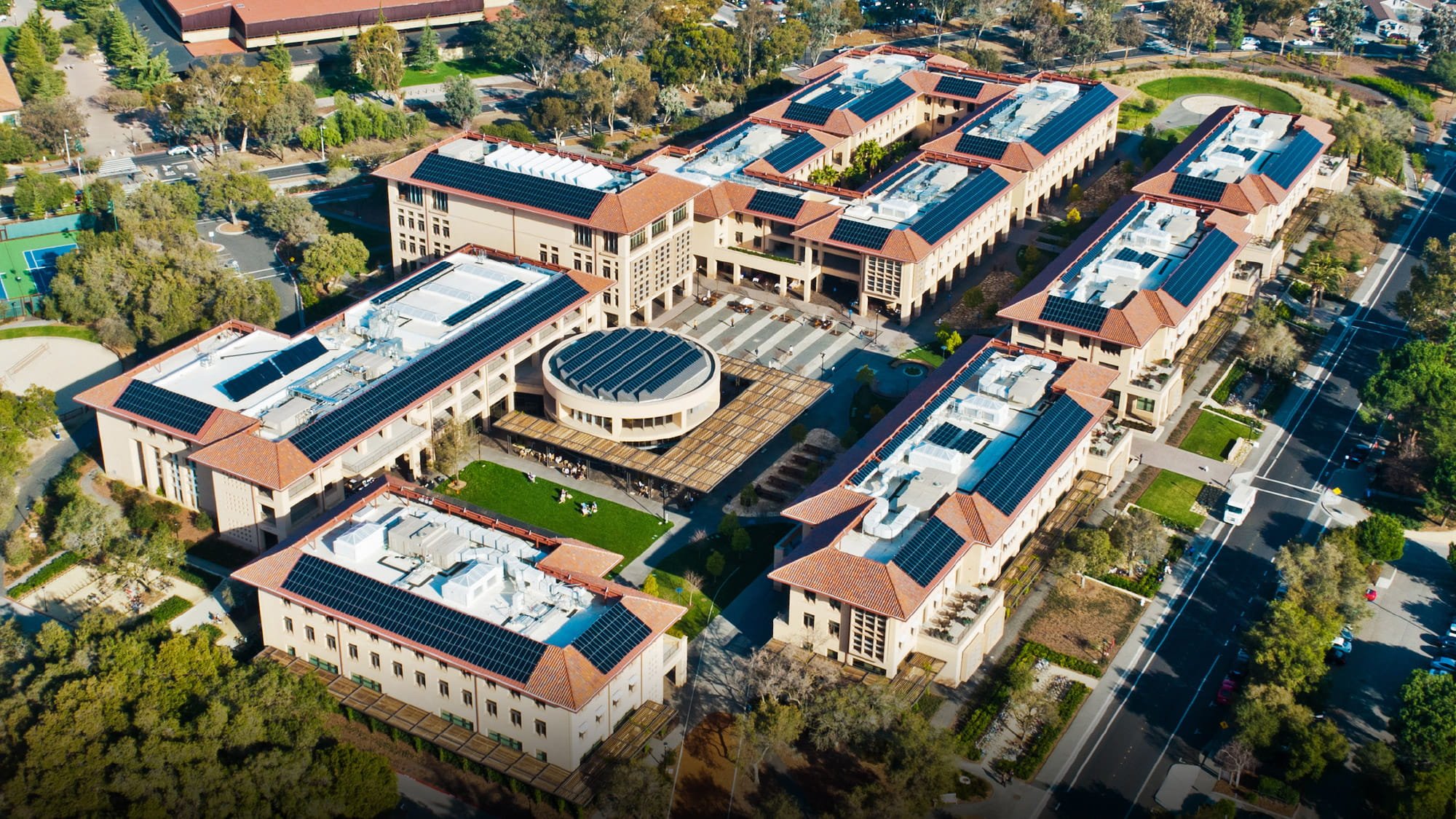Northwestern Kellogg & HKUST Lead the 2018 FT EMBA Rankings

Where should you go to school for your Executive MBA? Good question. While, the answer may not be quite so simple, an official EMBA ranking can help.
There are many things you should consider before choosing the best EMBA program for you including average graduation salary, industry employment, research interests, and more. However, a good place to start is with the 18th edition of the Financial Times Global Executive MBA Ranking. This ranking collects key data from business schools and alumni around the world to come up with a list of the top 100 best programs worldwide.
We’ve collated some of the critical data from the ranking study to give you insight into what’s going on in the world of EMBA programs.
EMBA Graduates Choose Industry and Manufacturing
Compared to full-time MBAs, EMBA graduates are much more likely to work in certain industries like manufacturing. In fact, three times as many EMBAs are employed in industry or manufacturing compared to their full-time peers. The figure accounts for 17 percent of all graduates. In comparison, only 10 percent of EMBA graduates are in consulting roles. And they’re less likely to work in finance, too.
EMBAs Earn More Money
EMBA graduates can also expect to earn more money than full-time MBAs after graduation. The average salary for an EMBA is $220,000 whereas an MBA alumnus can expect to make $146,000. It’s a large gap that’s similar to the salary gap between an MBA and a MiM graduate ($146,000 VS $67,000). Keep in mind, however, that the typical Executive MBA student is significantly older and often has more work experience.
In contrast, full-time MBAs win when it comes to salary boosts before and after earning the degree. MBA alumni generally increase their salary by 107 percent while EMBAs only experience a 59 percent boost.
Top 10 EMBA Programs
This year, the top ten EMBA programs, according to the Financial TImes, includes four joint programs. In fact, these were the top four programs in the world ranking well for post-EMBA salary, alumni leadership positions, and work experience. Each of these programs offer excellent networking opportunities thanks to different cohorts across different campuses, connecting students around the world.
Here’s how all the rankings stacked up.
1. Northwestern Kellogg & HKUST
This joint program ranks first for the third year in a row, and it’s the ninth time in 12 years that it has headed the list—the other three times it ranked second. The program is known for having the highest average salary three years post-graduation, $507,000—$140,000 more than the second-highest salary. It’s also known for having half of its alumni as company leaders three years post-graduation.

No EMBA has dominated the annual FT ranking quite like the Northwestern Kellogg & HKUST join program, earning top billing once again for 2018.
2. HEC Paris, LSE, & NYU Stern
This trium global EMBA program ranks second in 2018, up from fifth the previous year. The program is ranked first in work experience, languages, and international course experience rank. It also ranks highly in average salary ($347,970) with an expected 60 percent salary increase three years post-EMBA.
3. Tsinghua University & INSEAD
For the second year in a row, the Tsinghua-INSEAD dual degree MBA comes in third overall on the FT EMBA ranking. Located in China, Singapore, France, and the UAE, the program is known for its high salary three years post graduation ($365,746), and its high percentage of female students (45 percent).
The rest of the top ten shakes down as follows:
- EMBA—Global Asia: Columbia Business School, HKU, & London Business School
- Ceibs
- HEC Paris
- Washington University Olin Business School
- Shanghai: Jiao Tong University Antai
- IESE Business School
- MIT Sloan School of Management
Surprising Schools
There were quite a few surprises in this year’s EMBA ranking.
- Though HEC Paris has ranked in the top five since 2006 because of its joint program with NYU Stern and LSE, this was the first year the school entered the top ten ranking on its own. The HEC Paris solo EMBA program ranks sixth overall, making it the highest new entrant.
- IESE Business School took home the crown as the top EMBA program for the new criterion corporate social responsibility (CSR).
- The University of Toronto Rotman School of Management EMBA moved up the most places in 2018, rising to 47th place overall—20 places higher.

No school saw a bigger rankings jump than the University of Toronto Rotman School of Management, rising 20 spots in 2018.
FT EMBA Ranking Methodology
To come up with the 2018 EMBA ranking, the Financial Times reached out to a record 139 programs with two online surveys: the first completed by the school and the second by alumni who graduated from programs in 2014. The methodology of the ranking is as follows:
- Alumni were required to provide feedback on salary today, salary increase, career progress, work experience, and aims achieved—accounting for 55 percent of the ranking’s weight.
- Schools provided insight into ten criteria, accounting for 35 percent of the total ranking. Criteria included: gender and international diversity, board members, international program reach, and more.
- Accounting for the final 10 percent of the ranking was the FT research rank, which looks at the number of articles published by a school’s full-time faculty.
And, for the first time ever, this year’s EMBA ranking included a new criterion for corporate social responsibility (CSR). This new criterion took a look at how many of a school’s core courses were dedicated to ethics, social, and environmental issues. Weighting at 3 percent, this criteria replaced the number of Ph.D. graduates per school.
Financial Times Ranks the Top MBAs for Entrepreneurs

Leading entrepreneurs in the business world today can often be seen as trailblazers, standing strong and independent in an often cutthroat world. What isn’t seen as often is the kind of support—whether financial capital or mentorships—that can help get an idea off the ground. In recent years, business schools and MBA programs around the globe have made this kind of support for new businesses a core part of their operation, often offering entrepreneurship majors, business pitch competitions, startup incubators and more.
Each year, The Financial Times releases their ranking of the best MBA programs for entrepreneurship, helping up-and-coming entrepreneurs to make informed choices about the best program for their career and startup goals. Its latest ranking, for 2018, has just been released.
The 2018 ranking of the top MBA’s for entrepreneurship compiled fifty schools from around the world. A number of factors went into determining which schools would make the grade, including the percentage of graduates who started a company after earning their degree, percentage of female entrepreneurs, the extend to which funding from the school or from the school’s alumni network helped in the creation of new businesses, and more. These factors combined would help decide in what position a school would fall on the ranking.
This year, schools in the United States took the top three spots on the list: the Stanford Graduate School of Business, the F.W. Olin Graduate School of Business at Babson College, and the Tuck School of Business at Dartmouth College. Two UK business schools—the Lancaster University Management School and the Cass Business School—rounded out the top five.

Despite dipping numbers of students, the Stanford Graduate School of Business entrepreneurship program is still the top-ranked in the world, according to the Financial Times.
At Stanford, although it still ranked as the best school for entrepreneurship globally, there was actually a significant drop since in the number of students starting a business within three years of graduation. This year, it was just 22 percent of students compared with last year’s 36 percent. Babson College’s Olin Graduate School of Business also witnessed a drop; from 52 percent last year to 37 percent in 2018.
One explanation for the drop, however, is not that interest in entrepreneurship is declining, but instead being taken on more as a ‘side hustle’ than a full-time career. This was certainly the case for Samantha Penabad, a former strategy manager at Accenture and MBA at Berkeley’s Haas School of Business, who has been working on a digital donation platform called GivingFund. Although she didn’t intend on becoming an entrepreneur when she started business school, tutors at the university helped her to develop a business plan and a fellow student with finance experience joined as a co-founder. The service is scheduled to launch later this month.
But GivingFund remains a side job for Penabad, who will be taking on a full-time job in strategy and operations at Google in New York after graduation. As a result, someone like Penabad will be not be included in data for students starting businesses after graduation, but among those accepting full-time jobs. Students pursuing similar paths—working full-time but starting businesses on the side—may help explain the dip in entrepreneurship that many MBA programs are witnessing.
One reason behind this trend may be the fact that many students see a full-time role as just one step to eventually starting their own company. By putting their skills to work at a top company like Amazon or Google, students are able to more quickly pay off their student loans, which means eventually starting a business debt free. Companies like Amazon also may seek out those with entrepreneurial experience, because it demonstrates an attractive leadership quality.
“We welcome applicants with an entrepreneurial spirit,” says Amazon’s senior manager of campus recruiting, Dee Clarke. “They are given the ownership over their work, like they would [in] their own business, but within a global support network that provides added guidance and support.”
Guthrie Jones, an MBA at London’s Cass Business School, holds a similar philosophy. Although he had no intention of getting into entrepreneurship, he couldn’t stop thinking about one particular business idea and decided he’d have to pursue it. Guthrie believes his company, Icepick, which lets people rent out space on their hard drives, has the potential to become a global business. Still, if he right opportunity for a salaried role came up after graduation, he would gladly shift his plan to the side.
Nevertheless, student interest in studying entrepreneurship as part of their MBA has grown at schools like Cass. Part of this may be the result of Cass’s £10m investment fund, which has not only supported new MBA start-ups but has also trained students in the process of investing.
Financial Times MBA Entrepreneur Ranking (2018)
- Stanford Graduate School of Business
- F.W. Olin Graduate School of Business (Babson)
- Tuck Business School (Dartmouth)
- Lancaster University Management School
- Cass Business School (City University)
- Otto Beisheim School of Management (WHU)
- IMD Business School
- Saïd Business School (Oxford)
- Harvard Business School
- Judge Business School (Cambridge)
Why Online MBA Flexibility Really Matters

Earning an MBA, for many, can be a monumentally difficult decision. For the lucky few, their employers may provide the necessary funding to earn the degree or they already have expendable finances. For many others, though, the time and cost is just too much. However, Online MBA flexibility can help mitigate those difficult deciding factors.
Metro Jobs Report: Startup Experts, a De-Globalized World and more

Lets dig into the latest jobs news …
Round One Application Deadline for Olin Nov. 1

The first round of application deadline for the Two-Year and One-Year MBA programs at F.W. Olin Graduate School of Business is Nov. 1. Petia Whitmore, Dean of the Graduate School Admissions at Babson gave prospective students some advice for getting the application completed by the deadline. She advices applicants to carefully review the details of the application process and the requirements for admission for the program that they are applying to.
